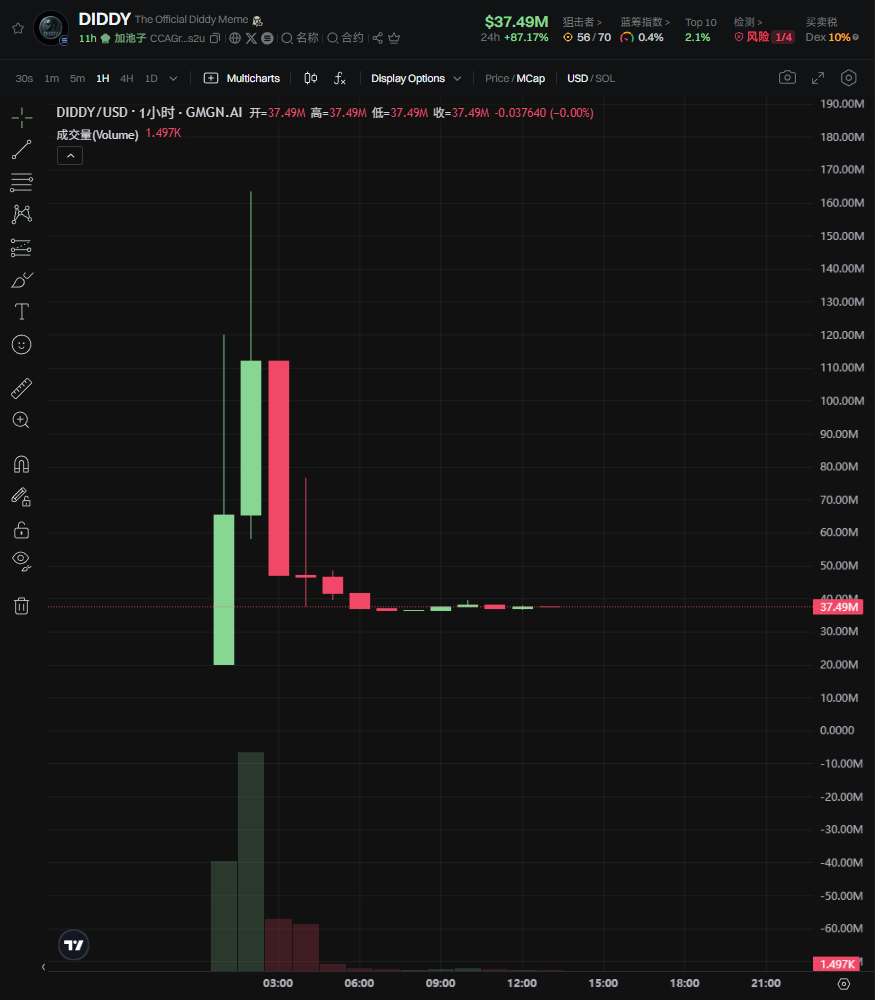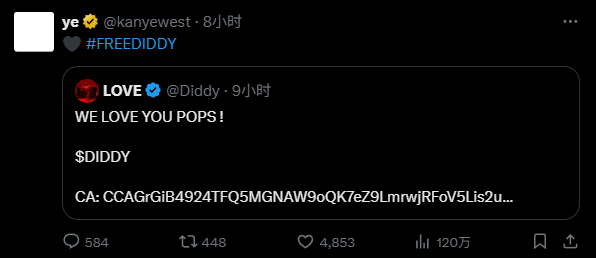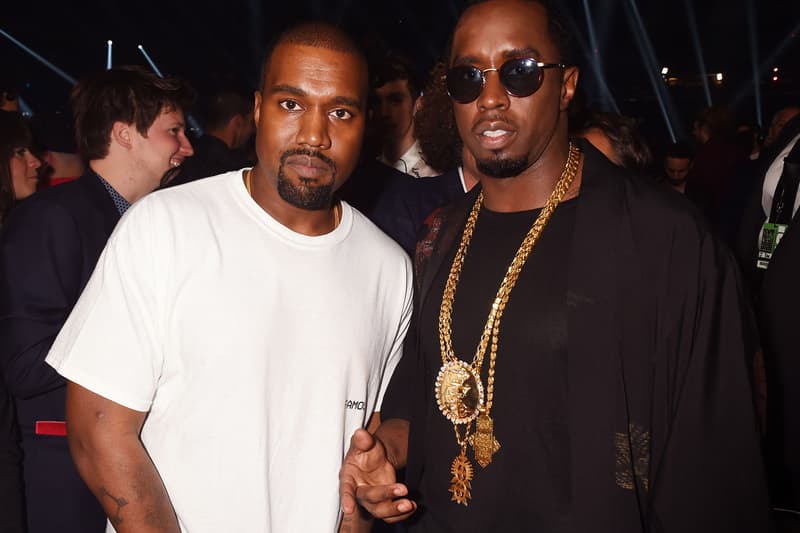Author: Luke, Mars Finance
what happened?

In the early morning of May 9, 2025, a dramatic event broke out at the intersection of the global entertainment and cryptocurrency circles. Rap superstar and fashion pioneer Kanye West (now known as Ye) retweeted a tweet containing the contract address of the meme coin DYDDY on the X platform.

This seemingly random forwarding was like dropping a nuclear bomb on the crypto market, instantly igniting the enthusiasm of speculators. According to data from the on-chain monitoring service OnChain Lens, two investors - let's call them address A and address B - acted quickly driven by FOMO (fear of missing out). Address A spent $632,200 to purchase 8.67 million DYDDYs, while address B invested $544,800 to purchase 4.46 million. However, just a few hours later, the price of DYDDY plummeted, address A lost $316,700, and address B lost $382,000, with a total loss of $698,700.
The background of this storm is staggering. DYDDY was born only 7 hours before Kanye retweeted it, and its market value once soared to a peak of 160 million US dollars, attracting countless eyes. However, the bubble burst quickly, and as of now, the market value of DYDDY has shrunk to 37 million US dollars, a decrease of nearly 80%. The on-chain data also revealed a hint of weirdness: a top trader bought accurately before Kanye retweeted it, making a huge profit of 1 million US dollars, triggering speculation of insider trading. Kanye's tweet not only set off a speculative frenzy, but also exposed the fragility of the meme coin market: celebrity effect, FOMO sentiment and tokens lacking fundamentals constitute a carnival that is destined to collapse. This farce is not only a financial Waterloo for the two investors, but also another irony of the speculative culture in the crypto circle.
What is DYDDY: A meme narrative based on controversy
The birth of DYDDY can be called a "quick legend" in the field of meme coins. As a typical meme coin, it has no white paper, no clear purpose, and even no decent official website. Its entire narrative seems to revolve around a name: Diddy, that is, Sean "Puff Daddy" Combs, the music mogul who is deeply involved in extortion and sex trafficking charges. The naming of DYDDY seems to be a joke to Puff Daddy, or a "tribute" in some crypto circle, but this bold choice is more like naming a ship "Titanic II" - both provocative and dangerous.
In the world of memecoins, narrative is everything. From Dogecoin’s “funny dog head” to Shiba Inucoin’s “dog successor”, successful memecoins often rely on humor or community culture to attract fans. DYDDY, however, chose controversial figures as its selling point, trying to create hype with P. Diddy’s popularity and Kanye’s endorsement. Kanye’s tweet instantly detonated this narrative, pushing DYDDY’s market value to $160 million. However, the lack of fundamental support quickly exposed its weaknesses. On-chain data shows that a large number of early holders sold at high points, leaving only the endgame of a sharp drop for FOMO chasers. A user on the X platform even joked: “The only use case for DYDDY is to remind you not to believe in coins pushed by celebrities.” From a market value of $160 million to $37 million, DYDDY proved the fate of memecoins: after the hype, it is empty after all.
Kanye and P. Diddy: A complicated "brotherhood"

Behind the DYDDY storm, it is inseparable from the complicated relationship between Kanye and Puff Daddy. As two legends in the music industry, their friendship has long gone beyond ordinary friendship. Kanye has publicly supported Puff Daddy many times, even when the latter was caught up in legal scandals. In 2024, after Puff Daddy was arrested on charges of extortion and sex trafficking, Kanye not only did not distance himself from him, but called him his "twin" and even wore a T-shirt designed by Puff Daddy in a controversial interview. A recording of a call leaked from prison was used by Kanye in his new song "Lonely Roads Still Go to Sunshine", showing that Puff Daddy was still cheering him up in prison. This kind of "brotherhood" seems to be traceable in the DYDDY incident. The choice of the coin name and the timing of Kanye's forwarding make people wonder whether this is a deliberate marketing gimmick.
However, this relationship also makes Kanye's motives more complicated. Was DYDDY's tweet a pure prank? Was it an implicit support for Puff Diddy? Or was it Kanye's usual "chaos-making" style? Kanye's actions in the crypto circle in recent years - including rumors of issuing his own token - have made people question his intentions. On the X platform, some people speculated that Kanye might have some connection with the DYDDY team, but there was no evidence to support it. Whatever the truth, Kanye's move once again proved his influence: a tweet can cause the market value to soar, or it can make investors lose all their money. This "brotherhood" may be sincere or hype, but for addresses A and B, the price is too painful.
The celebrity coin effect has dried up: from DYDDY to Yua Mikami’s $Mikami coin
Kanye's DYDDY incident is not an isolated case, but a microcosm of the growing ineffectiveness of celebrity-endorsed meme coins. Just a few days ago, the $Mikami coin associated with Japanese adult film star Yua Mikami went online, which also caused a short-term hype, but plummeted as soon as it was listed, and its market value evaporated by more than 60% from its high point. Just like DYDDY, the $Mikami coin also lacks substantive content and is purely supported by Yua Mikami's fame and fan economy. Driven by FOMO, investors flocked in, but were quickly trapped, and the X platform was full of complaints about "another celebrity coin scam."
The magic of celebrity endorsements is fading. In 2021, EthereumMax, promoted by Kim Kardashian and Floyd Mayweather, plummeted and triggered lawsuits, exposing the risks of celebrity coins. Today, the successive collapses of DYDDY and $Mikami coins further prove that the market's superstition that "celebrity = sudden wealth" is no longer effective. Regulation of the crypto market is still a gray area, and celebrities do not need to bear the same legal responsibilities as the stock market when promoting coins, which makes speculators more vulnerable. The $698,700 loss of addresses A and B, and the blood and tears of $Mikami coin investors, are all reminders that the celebrity effect may ignite the heat, but it is often the wallets of retail investors that are burned. X The previous user summed it up brilliantly: "Coins promoted by celebrities are like their albums: just listen to them, don't take them seriously."
Conclusion: The memecoin circus never stops
The DYDDY incident is a microcosm of the absurd ecology of the crypto circle: a celebrity tweet, an empty token, and a mess. Kanye West, with his unique talent for chaos, set off a roller coaster ride from a market value of $160 million to $37 million, and also made addresses A and B pay an expensive tuition of $698,700. This is not only a personal tragedy, but also a wake-up call for the meme coin speculation culture. DYDDY has nothing to do with technological innovation or financial freedom. It is a mixture of hype, impulse, and human greed.
The crypto circus will not stop. There will always be new meme coins, new celebrity endorsements, and new FOMO traps. Investors can only learn from the lessons of DYDDY and $Mikami coins: don't let the halo of celebrities cloud your judgment, and don't let FOMO get to your head. The next time Kanye throws out crypto hints, you might as well close your wallet, open his classic album "Yeezus", and quietly feel the true genius - at least, music won't make you lose money.














